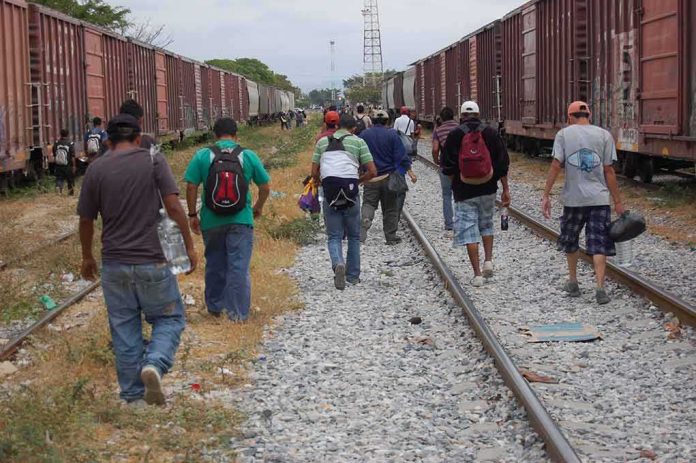
Kosovo becomes the first European nation to accept third-country deportees from the United States, sparking concerns that the Balkans are becoming a “warehouse” for migrants unwanted by Western powers.
Key Takeaways
- Kosovo has agreed to take in up to 50 migrants deported from the US for a maximum stay of one year, establishing a controversial precedent in Europe.
- Multiple Balkan nations including Albania, Kosovo, and potentially North Macedonia are striking deals with Western countries to host deportees and prisoners.
- Human Rights Watch warns that the Balkans risk becoming a migrant containment zone, with uncertain legal protections for deportees.
- These agreements appear driven by political leverage, with Kosovo potentially seeking diplomatic recognition in exchange for accepting migrants.
- The Supreme Court has allowed President Trump’s administration to resume deportations to third countries, facilitating these arrangements.
Balkans Becoming Dumping Ground for Western Immigration Problems
Under President Trump’s strengthened border policies, Western nations are increasingly shifting their immigration burdens to the Balkans. Kosovo has emerged as the first European country to accept third-country nationals removed from the United States, agreeing to host up to 50 deportees for stays of up to one year. This arrangement follows similar deals throughout the region, including Albania’s agreement with Italy and Kosovo’s previous $230 million contract with Denmark to house foreign-born prisoners.
“Balkan countries don’t have a really terrible history of human rights violations,” said Michael Bochenek, senior children’s rights counsel at Human Rights Watch.
The Trump administration’s immigration spokeswoman Tricia McLaughlin expressed support for these arrangements with her directive to “Fire up the deportation planes,” signaling the administration’s commitment to utilizing these new pathways for removing illegal immigrants from American soil. Kosovo’s willingness to participate in these arrangements comes after the nation previously housed approximately 1,900 Afghan citizens evacuated following the Taliban’s return to power in 2021.
Political Pressure and Financial Incentives
The surge in these agreements raises questions about the political pressure being applied to vulnerable Balkan states. Human rights advocates suggest these nations may be accepting these arrangements due to pressure from the European Union and desires for international recognition. Kosovo, which still seeks broader diplomatic recognition, may be leveraging its willingness to accept migrants as a bargaining chip for political support from Western powers.
“For better or worse these Balkan governments may have a sense of obligation to the European Union and therefore may be more open to such demands,” said Michael Bochenek, senior children’s rights counsel at Human Rights Watch.
The financial compensation offered for these arrangements appears significant on the surface. Kosovo’s deal with Denmark brought in over $230 million for housing foreign-born prisoners. However, critics question whether these short-term financial benefits outweigh the long-term social and political costs for these developing nations. Bosnia-Herzegovina has similarly received EU support for migrant reception centers as part of its cooperation on migration management.
Human Rights Concerns and Legal Challenges
Human Rights Watch has explicitly warned that the Balkans risk becoming a “warehouse for migrants” as these agreements proliferate. While noting that Balkan nations generally have better human rights records than some alternative destinations, the organization emphasizes the need for careful scrutiny of these arrangements. The legal status of deportees housed in third countries remains murky, with concerns about their access to legal representation, asylum processes, and basic services.
The Italy-Albania agreement has already encountered significant legal obstacles, with Italian courts ordering the return of some migrants sent to Albania. This demonstrates the potential legal complications that could arise from Kosovo’s agreement with the United States. Human rights advocates emphasize that these arrangements create isolation for deportees, potentially limiting their ability to challenge their deportation status or seek protection under international law.
Implications for American Immigration Policy
President Trump’s administration has successfully cleared legal hurdles to implementing third-country deportation arrangements, with the Supreme Court allowing such deportations to resume. This Kosovo agreement represents a significant expansion of available options for removing illegal immigrants from American soil. The arrangement with Kosovo could serve as a template for similar agreements with other countries, potentially relieving pressure on America’s immigration system while raising questions about the treatment of deportees.
As the Balkans increasingly become a destination for deportees from Western nations, these arrangements represent a major shift in how developed nations manage migration. Rather than addressing root causes or developing comprehensive immigration reforms, these policies effectively outsource immigration enforcement to poorer nations willing to accept financial incentives. The long-term sustainability of such arrangements remains questionable, particularly as they face continued legal scrutiny and human rights concerns.




